2023 Winner of Peace Corps Writers’ Award as “Writer of the Year”
Richard Wiley
(Korea 1967–69)
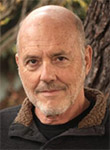
Richard Wiley – Writer-of-the-Year
Richard Wiley, who served as a Peace Corps Volunteer in Korea, 1967-69, is an American novelist and short-story writer whose first novel, Soldiers in Hiding, won the 1987 PEN/Faulkner Award for Fiction. Since then, he has published seven other novels and a wide variety of short stories. His subsequent novels, Fool’s Gold, Festival for Three Thousand Maidens, and Indigo received favorable notice in America’s flagship book periodical the New York Times Book Review, and elsewhere. Despite this, only his more recent book Ahmed’s Revenge, published by Random House remains in print.
Richard holds a B. A. from the University of Puget Sound and an M. A. from Sophia University in Tokyo. He earned his MFA in Creative Writing from the Iowa Writers’ Workshop, where he studied under the venerable John Irving. Since 1989, Richard has been a Professor of English at the University of Nevada, Las Vegas. He is also a Professor Emeritus of English and a Board Member of Black Mountain Institute at the University. He founded the university’s graduate Creative Writing Program. In 2005, he was inducted into the Nevada Writers Hall of Fame.
 His first novel, Soldiers in Hiding, was well received by the public. It prefigured a whole life to follow of creative writing in the public square. The novel itself is a haunting portrayal of war’s lingering emotional burdens. Set in 1941 Tokyo, its two central characters, Jimmy and Teddy, are Japanese-American friends and jazz musicians playing Tokyo’s lively nightclub scenes. Then, stranded in Japan after the bombing of Pearl Harbor, they are drafted into the Japanese army and sent to fight American troops in the Philippines. Their attempts to remain neutral are shattered when Jimmy is killed by his commanding officer for refusing to shoot American POWs. Some 30 years later, a chance sighting of the Japanese officer offers Teddy the prospect of revenge and redemption—but it seems that this former officer had likewise been waiting all these years for a similar encounter. Teddy is married to Jimmy’s widow, is father to his son, a star on Japanese TV—still struggling with guilt over his friend’s execution by this former Japanese army officer.
His first novel, Soldiers in Hiding, was well received by the public. It prefigured a whole life to follow of creative writing in the public square. The novel itself is a haunting portrayal of war’s lingering emotional burdens. Set in 1941 Tokyo, its two central characters, Jimmy and Teddy, are Japanese-American friends and jazz musicians playing Tokyo’s lively nightclub scenes. Then, stranded in Japan after the bombing of Pearl Harbor, they are drafted into the Japanese army and sent to fight American troops in the Philippines. Their attempts to remain neutral are shattered when Jimmy is killed by his commanding officer for refusing to shoot American POWs. Some 30 years later, a chance sighting of the Japanese officer offers Teddy the prospect of revenge and redemption—but it seems that this former officer had likewise been waiting all these years for a similar encounter. Teddy is married to Jimmy’s widow, is father to his son, a star on Japanese TV—still struggling with guilt over his friend’s execution by this former Japanese army officer.
In an extensive interview with Pif Magazine, in which the pitfalls between sales of his novels and awards are discussed, Richard was asked about the difference between those two pillars of publication: which would you prefer? Richard answers: “the sales without question because it means that people have read your book.” In a follow-up question, another question was: “Which do you think is harder to deal with, the uncertainty you felt before publishing anything or the frustration of having what you’ve published go out of print?” He responded: “If they go out of print too quickly, then it’s like dealing with some controllable form of cancer. If you think about it too much, it’ll consume you, so you don’t think about it too much, except to get pissed off every once in a while”.
Since being a successful writer entails mastering two different crafts: writing and publishing, another question put to Richard was: “as you teach Creative Writing students, do you ever focus on publishing?” Richard responded: “it is almost never an issue because the writing isn’t good enough for me to go to bat for it. If I think the work is ready, I’ll volunteer to help get it published, but I don’t like to be asked because even though many of my students have great potential, their work may not yet be ready for publication. I concentrate my efforts on the writing, because I can’t publish a book by myself”.
In the highly competitive professional field of creative writing, Richard Wiley has been a persistent advocate and consistent contributor to its contemporary presence in our community, even though most of his well-recognized novels go out of print quite quickly, meriting him a hard earned Profile in Citizenship.
•
Since the above interview was conducted Ahmed’s Revenge received the 1999 Peace Corps Writers Maria Thomas Fiction Award.
plus
Richard has published the following novels:
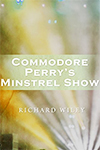 Commodore Perry’s Minstrel Show [2007] — “When the U.S. Navy’s Commodore Perry sailed into Edo (now Tokyo) with the grand goal of opening Japan to trade, he brought major change and minor entertainment—a black-face minstrel show that amazed and perplexed its audience.” A clash of cultures emerges.
Commodore Perry’s Minstrel Show [2007] — “When the U.S. Navy’s Commodore Perry sailed into Edo (now Tokyo) with the grand goal of opening Japan to trade, he brought major change and minor entertainment—a black-face minstrel show that amazed and perplexed its audience.” A clash of cultures emerges.
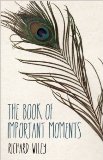 The Book of Important Moments [2013] —“Married, pregnant, and happy, Ruth Rhodes is confronted by the man who raped her years earlier, and must come clean with herself and her husband while he negotiates the grief and mystery surrounding the murder of his own mother. The rapist, meanwhile, stands atop this narrative, telling his side of the story in diabolically captivating ways.”
The Book of Important Moments [2013] —“Married, pregnant, and happy, Ruth Rhodes is confronted by the man who raped her years earlier, and must come clean with herself and her husband while he negotiates the grief and mystery surrounding the murder of his own mother. The rapist, meanwhile, stands atop this narrative, telling his side of the story in diabolically captivating ways.”
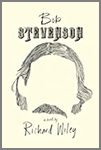 Bob Stevenson [2016] — “A witty, roller-coaster ride of uncertain identity set against the gritty certainties of New York City. In compelling, unadorned prose, Richard Wiley gives us a bewitching and ultimately moving tale.”
Bob Stevenson [2016] — “A witty, roller-coaster ride of uncertain identity set against the gritty certainties of New York City. In compelling, unadorned prose, Richard Wiley gives us a bewitching and ultimately moving tale.”
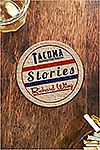 Tacoma Stories [2019] —”Richard Wiley is one of our best writers. These stories satisfy in the way that brilliant short fiction always satisfies; one feels as if one has absorbed the expansive vision and drama of a novel. Read slowly, and I bet you’ll want to read again.” — Richard Bausch , author of Peace and Living in the Weather of the World. “It’s a strange and winsome feeling I have, reading Tacoma Stories, the blue sensation that Richard Wiley has made me homesick for a place I’ve never been, mourning the loss of friends I never had, in a life where each and every one of us is loved, however imperfectly. Think Sherwood Anderson inhabiting Raymond Carver’s Northwest and you’ll have a clear picture of Wiley’s accomplishment.” — Bob Shacochis (St. Vincent – Eastern Caribbean 1975–76)
Tacoma Stories [2019] —”Richard Wiley is one of our best writers. These stories satisfy in the way that brilliant short fiction always satisfies; one feels as if one has absorbed the expansive vision and drama of a novel. Read slowly, and I bet you’ll want to read again.” — Richard Bausch , author of Peace and Living in the Weather of the World. “It’s a strange and winsome feeling I have, reading Tacoma Stories, the blue sensation that Richard Wiley has made me homesick for a place I’ve never been, mourning the loss of friends I never had, in a life where each and every one of us is loved, however imperfectly. Think Sherwood Anderson inhabiting Raymond Carver’s Northwest and you’ll have a clear picture of Wiley’s accomplishment.” — Bob Shacochis (St. Vincent – Eastern Caribbean 1975–76)
PEN/Faulkner winner Richard Wiley is one of the 21st century’s best storytellers. In his newest book, THE GRIEVERS’ GROUP, (2022) he chronicles the lives of people who have suffered great loss. One is suicidal and terribly difficult to like; another serves up stories of a lifelong series of affairs; a third won a small fortune in Las Vegas while trying to unravel the truth about his late wife; and, another caused the death of a lover – personally delivering it from the barrel of a gun.
It is a wild ride with an unforgettable cast of characters whose stories Wiley unfurls with unfailing sympathy but also with his signature wit and humor.

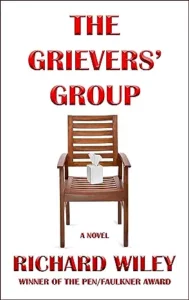
Dear Richard, What a well-deserved honor!
For others, if you haven’t already, it’s time to begin reading his novels. He’s a great novelist, and the cream of the crop of Peace Corps writers.
My best, Marnie
Thank you, Marnie!
It’s great to hear from you!